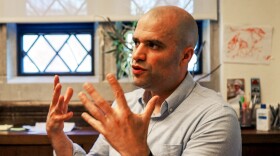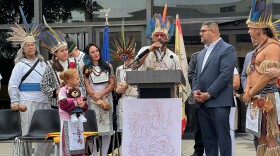As if Bad Bunny was not making enough headlines with his Puerto Rico residency starting this Friday, the worldwide reggaeton sensation dropped the long-awaited music video for the opening track of his most-recent, most-Puerto Rican album, DeBÍ TiRAR MáS FOToS, on Independence Day.
The timing makes sense, given his first words on “NUEVAYoL” describe a drunken Fourth of July celebration with his cousin in Washington Heights. But it’s what he did with the video that has got people talking.
A message of unity
The first two-thirds of the music video focus on a Puerto Rican wedding in the ‘70s. It’s chaotic, and fun, and colorful, and diverse. But when the bridge begins, as Bad Bunny shushes the listener and warns in Spanish, “Careful, don’t let anyone hear us,” the scene shifts to him , above a notably light blue Puerto Rican flag, inspired by the Lares or first revolutionary flag on the island.
It billows in the wind before the camera comes back down to street level. A group of guys sit around a ‘70s style stereo on the street in New York City when a voice that sounds like President Donald Trump comes from the speakers, saying he’s made a mistake and wants to apologize to immigrants.
“I want to say that this country is nothing without the immigrants,” he continues. “This country is nothing without Mexicans, Dominicans, Puerto Ricans, Colombians, Venezuelans, Cubans…”
One of the guys shuts the radio off. And they all get up to leave, shaking their heads. At the end, the screen goes black and reads “Juntos somos mas fuertes,” or “Together we are stronger.”
As Bad Bunny fans first watched this message, meanwhile, the real President Trump was , which includes historic funding for Immigration and Customs Enforcement.
The timing of the video release comes after Bad Bunny used his influence across social media platforms, which includes 81 million followers on Spotify and 49 million on Instagram, to speak out against ICE during an alleged immigration arrest he witnessed in Puerto Rico.
Yale studies the politics of Bad Bunny
The “NUEVAYoL” music video is far from the only example of Bad Bunny’s commentary on politics. After all, his tour for this album explicitly does not set foot on the U.S. mainland — because, he “it’s unnecessary.” Instead, Bad Bunny will be performing 30 shows in Puerto Rico from July through September with a third of the dates reserved for Puerto Rico residents only. And the residency is titled, “No me quiero ir de aqui,” or “I don’t want to leave here.”
Yale University Professor Albert Laguna said on a recent episode of ���ϳԹ���’s “The Wheelhouse” the residency is highlighting “the importance of saying Puerto Rico is for Puerto Ricans.” He’s exploring the topic, and more, this fall with the new course, “Bad Bunny: Musical Aesthetics and Politics.”
“We're seeing this massive migration from Puerto Rico in the 21st century, given the difficult economic conditions, the devastation from the hurricanes and people having to leave because, you know, Puerto Rico is a very expensive place to live as well,” Laguna said. “And you have foreign capital from the United States coming in, people buying up properties. It's creating a lot of issues and reasons to migrate.”
Three-time Grammy Award-winning Bad Bunny, born as Benito Antonio Martínez Ocasio, has one of the largest platforms in the world, and Laguna said he’s using it to call attention to important issues. His albums have broken most streaming records, and even more so when you consider they are also Spanish language. All 17 songs on DeBÍ TiRAR MáS FOToS charted on the Billboard Top 100 in 2025, earning Bad Bunny the title of the first Latin artist to get over 100 song entries on the chart. Before that, Un Verano Sin Ti (2022) was Billboard’s best-performing album of the year, the first Spanish language album to reach that feat.
“Bad Bunny is talking a lot about the difficult political situation in Puerto Rico — the corruption he's talking about, the economic difficulties that cannot be separated from the colonial relationship with the United States. And he's speaking to this through different musical forms, the musical forms that have been utilized historically for protests. Like plena, right?” Laguna said.
Some feel he’s the best representation Puerto Rico has had on the global stage in this generation, pointing to his incorporation of traditional music within the modern genre, his breaking of cultural norms surrounding gender and sexuality, and the wider acceptance of the Puerto Rican dialect that has been teased for its L-sounding R’s for decades (hence the spelling of “NUEVAYoL”).
“What's really exciting for my students, where there's a great deal of low morale given the attacks on higher education by the Trump administration, is that we can listen to protests. We can protest, and that can also be joyful, right? And this music gives us a way into thinking about that intersection,” Laguna said.
A spotlight on Puerto Rican Studies
Though Bad Bunny is the entrypoint of Laguna’s class, the curriculum will discuss many subjects that apply to Puerto Ricans both on and off the island.
The latest from the University of ���ϳԹ���’s Puerto Rican Studies Initiative, headed by fellow "The Wheelhouse" guest Charles Venator-Santiago, show about 8% of ���ϳԹ���’s population identifies as Puerto Rican, which is the highest percentage of any state in the U.S. So, Yale’s location is not lost on Laguna.
“There hasn't been a standalone course on Puerto Rico for quite a few years at Yale, which is unfortunate to say the very least, given how little students know about Puerto Rico and maybe the general public,” he said, “specifically Puerto Rico's colonial status in relation to the United States.”
Laguna will not be the first to teach a college course about Bad Bunny. Professor Petra Rivera-Rideau of Wellesley College in Massachusetts has been teaching a class about Benito since 2022.
“I think from his earliest access to these larger public platforms, Bad Bunny has been speaking out about issues that pertain to Puerto Rico, which, as Albert said, many people in the United States aren't aware of, right?” Rivera-Rideau said. “And so I think that's always been a part of his MO, but what's different about DeBÍ TiRAR MáS FOToS is the sort of explicit nature of the politics that he's doing in every song with the blend of genres, when the topics he's talking about with his music videos, right? It's very intentional, and it's very interesting to me, because … as Bad Bunny has become more famous, he has leaned more into his political orientation, not less.”
It didn’t make national headlines when Rivera-Rideau began her course, even though she is one of the premier experts in the field. She’s already authored, “Remixing Reggaetón: The Cultural Politics of Race in Puerto Rico,” and her upcoming book, “P FKN R: How Bad Bunny Became the Global Voice of Puerto Rican Resistance,” only bolsters that.
“I'm really excited that Albert's teaching his class at Yale,” she said. “There's several Bad Bunny classes now. I know of some in Princeton, San Diego State, Barnard College.”
Laguna says, though, the day after published, he got a call from The New York Times.
“I think I can assume that no one's monitoring articles published at my alma mater, Montclair State University in New Jersey, right?” he said. “Yale has this kind of outsized place in kind of molding conversations about higher education in this country. So, the fact that you put Yale and Bad Bunny together, it attracts attention.”





